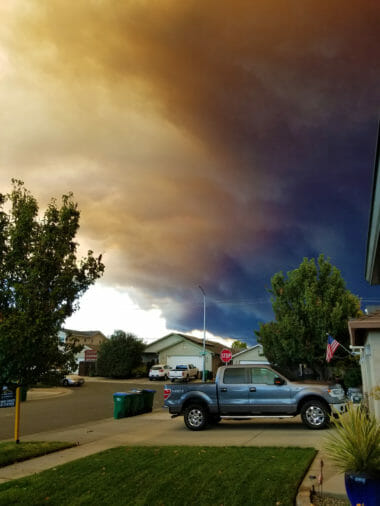The Camp Fire one year later: Church continues ministry to those affected

Smoke from the Camp Fire is visible from the Rev. Gail Hill’s home in Chico. (photo: The Rev. Gail Hill)
A bit more than a year after the deadly Camp Fire in Northern California, First Baptist Church (FBC), Chico, continues to help those affected. At the time of the disaster, the church received $15,000 in One Great Hour of Sharing funds from American Baptist Home Mission Societies, on behalf of American Baptist Churches USA.
Raging for weeks in November 2018, the wildfire, according to news reports, burned more than 150,000 acres, displaced tens of thousands of people and was the deadliest wildfire in California history, killing 85 individuals. As it destroyed Paradise, Concow and Magalia, it filled the sky with dark, apocalyptic clouds of smoke visible from neighboring Chico.
FBC joined with other area churches to discuss needs that had remained unmet. The result is adult support groups run by professional facilitators and offered free to participants at eight locations. Once monthly, FBC hosts Resilience Resources, the nonsectarian nonprofit company formed to coordinate the support groups.
“There were places for kids dealing with trauma, and opportunities for seniors,” says the Rev. Gail Hill, pastor of FBC. “Where it felt like there was a missing link was with adults to just come together and be in the same space—vulnerable as they were—and be able to share.”
When schools in Paradise burned to the ground and Paradise Unified School District phoned to see if FBC could provide classroom space, it was easy for FBC to say “yes.” FBC already had working classrooms from a learning disabilities school that had been housed there years prior.
Eventually the school district moved the schools to an empty airplane hangar, and FBC’s space was once again open to provide another ministry. That’s when a child development center came knocking, according to Hill. The center was being ousted from its home, and finding an affordable location was nearly impossible because the already existing housing crisis was growing worse since the fire.
“They signed a five-year agreement,” says Hill. “As far as we’re concerned, they can be here forever. We just had signs made. They’re thrilled. And we are, too.”

